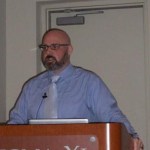Science Education
In today's Los Angeles Times Dr. Irving Epstein, Brandeis University chemistry prof and HHMI investigator, writes in "The science of science education":
In 2005, more than two-thirds of the American scientific workforce was composed of white males. But by 2050, white males will make up less than one-fourth of the population. If the pipeline fails to produce qualified nonwhite scientists, we will, in effect, be competing against the rest of the world with one hand tied behind our backs.
Let me repeat: By 2050, white males will make up less than one-fourth of the [U.S] population.
There are…
Steve Silberman and Rebecca Skloot just pointed out to me an editorial from science writer Chris Mooney that has appeared online and will be in the Sunday, January 3rd edition of The Washington Post.
In the essay, "On issues like global warming and evolution, scientists need to speak up," Mooney continues his longstanding call to scientists to take ownership in combating scientific misinformation, invoking the very weak response of the scientific community to the aftermath of e-mails and documents hacked from the Climatic Research Institute at the University of East Anglia.
The central lesson…
What do you call a biologist who uses bioinformatics tools to do research, but doesn't program?
You don't know?
Neither does anyone else.
The names we use
People who practice biology are known by many names, so many, that the number of names almost reflects the diversity of biology itself.
Sometimes we describe biologists by the subject they study. Thus, we have biologists from anatomists to zoologists, and everything in between: addiction researchers, chronobiologists, epidemiologists, immunologists, microbiologists, neuroscientists, pharmacologists, physiologists, plant biologists,…
The December 2009 edition of the Journal of Science Communication is now online with some intriguing articles - all Open Access so you can download all the PDFs and read:
Control societies and the crisis of science journalism:
In a brief text written in 1990, Gilles Deleuze took his friend Michel Foucault's work as a starting point and spoke of new forces at work in society. The great systems masterfully described by Foucault as being related to "discipline" (family, factory, psychiatric hospital, prison, school), were all going through a crisis. On the other hand, the reforms advocated by…
Although I've known Craig McClain for a few years now, both online and offline, I only had some vague ideas about what kind of research he is doing. I knew it has something to do with the Deep Sea and with the evolution of body size, but I did not know the details. So, when the opportunity arose to hear him give a talk summarizing his work, I jumped to it and went to see him on Tuesday at Sigma Xi as a part of their pizza lunch series.
First I have to say that Craig is a great speaker (if you are looking for one for a seminar series, this is useful information for you) - it was fun and very…
Please join us on NC State's Centennial Campus on Wednesday, Dec. 16, from 6 to 8 p.m. for two special speakers.
Our "seasonal" speaker is Dr. Larry Silverberg (aka Dr. Silverbell), NC State professor of mechanical and aerospace engineering and world-renowned expert on the "Science of Santa." Dr. Silverbell will present his latest research on the advanced material properties of Santa's sleigh and review previous research on toy delivery and time travel.
Continuing with the theme that science and engineering can be fun and educational, Dr. Laura Bottomley, electrical engineer and director of…
Next Sigma Xi pizza lunch science talk:
Pizza lunch returns at noon, Tuesday, Dec. 15 with a talk by marine biologist Craig R. McClain, assistant director of science for the National Evolutionary Synthesis Center in Durham. McClain conducts deep-sea research and has participated in expeditions to the Antarctic and to remote regions of the Pacific and Atlantic. Expect him to dive into puzzling realms with his talk: An Empire Lacking Food: The Astonishing Existence of Life on the Deep Sea Floor.
American Scientist Pizza Lunch is free and open to science journalists and science communicators of…
Imagine the following scenario. Two guys are walking down the street, in different cities. Guy A has two PhDs, one in quantum physics with a focus on dimensionality dynamics, the other in astrophysics with a focus on relativistic aspects of gravity and black holes. She has published dozens of peer reviewed papers on both topics and is a brilliant mathematician. Guy B never took a physics class but yesterday he finished reading large parts of The Elegant Universe. Suddenly, at the same moment, they each have an idea (they do not have the same idea ... they have different ideas) about how…
I mean, you might be, but I'm certainly not going to take your word for it....
I have an email from a blogeague (that's a colleague in the blogosphere) asking for clarification on the use of the word Skeptic in relation to climate change. This is a person very much involved in ocean conservation who had understood the word "skeptic" to mean a person who "does not believe in" anthropogenic global warming, but I had used the term in a blog post to describe a person who is not an AGW denialist. We have a commenter on this site who seems to have been pretending to have just woken up one recent…
Looking for that perfect gift for the geophile in your life?
How about a VOLCANO THAT ERUPTS A DINOSAUR. Honestly, could it get any better?
When I saw this in the store, I was a little dumbfounded ... but really, it just makes sense.
If you are in New York, you should see this:
Mysteries of the Congo: Exploring the World's Deepest River
FEATURING Ichthyologist Melanie Stiassny
WHAT SciCafe presents Mysteries of the Congo: Exploring the World's Deepest River, featuring Museum Ichthyologist Melanie Stiassny.
What strange new species lurk beneath? Join Museum Curator Melanie Stiassny, an ichthyologist who has been featured on The Colbert Report, as she answers this question and discusses her team's adventures and amazing discoveries in Africa's Congo River, the deepest in the world.
Surrounded by magnificent…
tags: ScienceBlogs, National Geographic, news
I have friends at National Geographic, so I was most pleased to read early this morning (last night, USA time), that ScienceBlogs and National Geographic have teamed up to provide outstanding science and nature content to the public!
I am sure it has not been a mystery to any of you that ScienceBlogs and National Geographic share the same ultimate mission: to cultivate widespread interest in science and the natural world. Starting today, SB-NG will work together to advance this common mission by providing new content, applications, and…
You can follow the event virtually in Second Life - just click here and teleport.
Last couple of weeks months were awfully busy, on many fronts, not least finalizing the ScienceOnline2010 program, herding cats almost 100 moderators/presenters to do various stuff (e.g., respond to my e-mails) in a timely manner, and making sure that registration goes smoothly. This is also the time of year when activation energy for doing anything except going to bed to hide under the covers is very high for people suffering from SAD. Thus, you did not see many 'original' posts here lately, I know.
But, it's not that I have been totally idle. Apart from teaching my BIO101 lab again, I also…
The North Carolina Museum of Natural Sciences hosts the final offering of its Charles Darwin Lecture Series on Tuesday, November 24 -- the 150th anniversary of Darwin's landmark publication of "The Origin of Species." Join Museum paleontologist and science historian Paul Brinkman for a free presentation titled "Charles Darwin's Beagle Voyage and the Origin of 'The Origin.'"
Dr. Brinkman completed his PhD in History of Science at the University of Minnesota with research in the history of 19th-century natural sciences, especially geology and paleontology. He has published a number of articles…
NESCent and SCONC:
What: November SCONC-fest
When: Thursday November 19th , 6-8pm
Where: National Evolutionary Synthesis Center in Durham
Please join us to commemorate Charles Darwin's 200th birthday and the 150th anniversary of "The Origin of Species."
Learn about the wild world of Ice Age carnivores, brainy birds, and other creatures Darwin missed. Our tour guides will be four postdocs on the frontiers of biology.
We'll begin at 6pm at the National Evolutionary Synthesis Center in Durham. Parking is free.
National Evolutionary Synthesis Center (NESCent)
2024 W. Main Street, Suite A200…
Brandon Haught is Director of Florida Citizens for Science Communications and has been a tireless advocate for science education across this large and educationally diverse state. His blog, an activity of the larger Florida Citizens for Science organization, carries this mission:
This blog is used to keep track of the good, bad and ugly science news in our state and beyond. We tend to focus on educational issues. When a science class makes the news for doing something interesting or positive, I try to make sure a post goes up here about it. When a Florida scientist gets out into the…
From the American Museum of Natural History:
SciCafe presents Naughty vs. Nice: The Biological Basis of Greed and Altruism, featuring biologist Lee Dugatkin, University of Louisville, and AMNH Curator of Invertebrate Zoology Rob DeSalle.
Join fellow New Yorkers to discuss what makes us naughty or nice by uncovering the evolutionary and cultural roots of greed and altruism, and compare these seemingly human behaviors to those of other species.
Surrounded by magnificent geological specimens in the Gottesman Hall of Planet Earth, enjoy the Museum after hours with music, drinks, and thought-…
Bergman gave the argument FOR Intelligent Design, and Myers gave the argument AGAINST.
I have never seen an argument against Intelligent design so well made. It would seem that Intelligent Design is a point of view rather than a coherent theory, one that emerges as a socio political side-effect of the struggle between atheism and religion, one that has many proponents but no valid scientific published research to support it. Intelligent design, according to what I saw argued, makes little internal coherent sense. It is based on a two step process of reasoning: Irreducible complexity, which…


